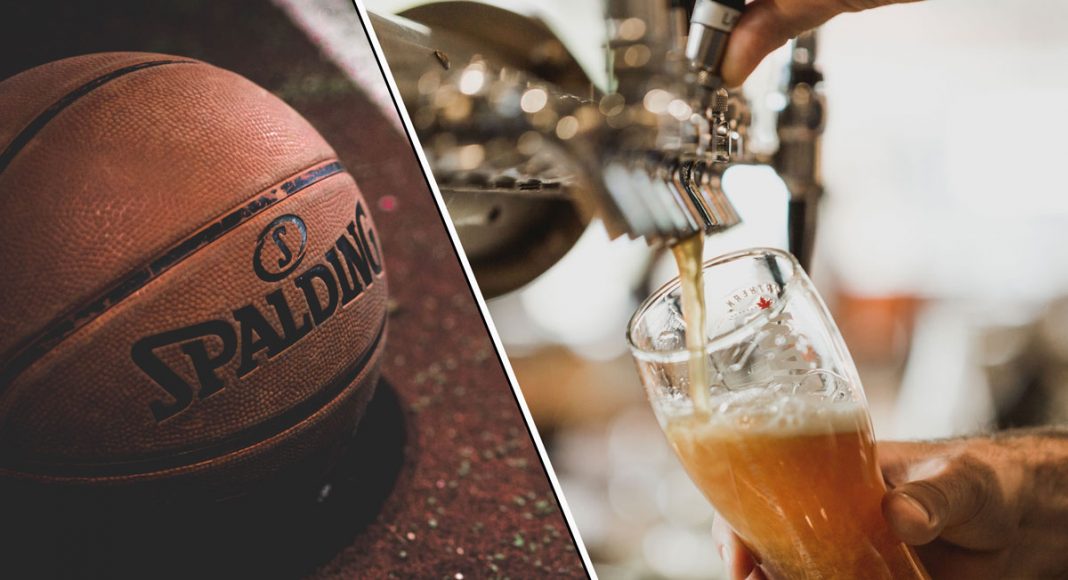For every tip-off during March Madness, it’s a sure bet that students at the schools playing in the basketball tournament will be tipping up more beer bottles than usual.
This was one of the key findings of an analysis we conducted recently on the impact of the NCAA men’s basketball tournament on college students’ drinking behavior.
We are all economists with a keen interest in the relationship between health and economics. Our recent study shines light on the well-established fact that alcohol consumption – and the negative effects that come along with it – often goes hand in hand with college sports. For that reason, college sporting events represent prime opportunities to think about ways to curtail drinking among college students.
A Long Standing Tradition
Researchers have long known that alcohol consumption rises during college sporting events. Study after study has found that college students were more likely to binge drink on football game days.
The same is true for college basketball. For instance, a study of 206 undergraduate students at Syracuse University in 2003 – when Syracuse won the NCAA men’s basketball championship – found that alcohol consumption on the two game days of the championship exceeded what is typical on campus.
Negative Effects
Binge drinking is associated with many harmful outcomes for the drinker and those around them. These outcomes include lower grades and increased rates of drunk driving and sexual assault. One study found that assaults, vandalism and arrests for disorderly conduct and alcohol-related offenses increased on college football game days in the towns that hosted the game, especially after upsets.
What is it about college sports that seems to lead to increased rates of drinking? The first thing to understand is that college students binge drink and report heavy alcohol use at higher rates than their peers who aren’t in college. Social norms likely play a large role in this fact. For instance, one study found that college students tend to think that their peers drink more than they actually do. This perception can cause individuals to believe that heavy drinking is the norm, not the exception.
A different study found that alcohol consumption can be reduced among college students by providing them with accurate information about how often their peers drink.
The Role Of High-Stakes Games
In order to understand how a major college sporting event affects alcohol consumption across different colleges, we examined the effect of the NCAA men’s basketball tournament on college students’ reported alcohol use.
We relied on the Harvard School of Public Health College Alcohol Study, which provides information on students’ alcohol consumption at 43 NCAA Division I institutions in 1993, 1997, 1999 and 2001. With this data, we compared drinking rates before, during and after the tournament as well as across tournament and non-tournament schools each season.
We found that nearly 60 percent of male students whose school had just played in the men’s basketball tournament reported binge drinking once more in the past two weeks than a male student whose school did not play a tournament game during the survey window.
Overall drinks consumed experience a similar jump, as male students at tournament schools reported drinking 6.9 additional alcoholic beverages on average during the tournament. These numbers are comparable with elevated drinking estimates associated with college football game days.
White Males Affected Most
The increase in binge drinking appears to be concentrated mostly among white male students. While 60 percent of male students binge drink more when their team plays in the NCAA Tournament, we detect no increase in alcohol consumption among female students.
According to our study, approximately 1 in 3 students who are over 21 appear to binge drink more when their team plays in the NCAA tournament. One in 4 underage students report binge drinking once more when their team plays.
The College Alcohol Study asked respondents about drinking and driving, so we were able to observe that students not only reported drinking more during the NCAA tournament, but that they were also about 10 percent more likely to report driving under the influence of alcohol or riding with someone who is under the influence.
Our paper adds to the growing amount of evidence that alcohol consumption during college sporting events has harmful effects on society. While we do not know of any single solution for all students at all schools, we note that reducing the availability of alcohol at sporting events has the ability to reduce “arrests, assaults, ejections from the stadium, and student referrals to the judicial affairs office.”
![]() The National Institutes of Health has also created resources for both parents of college students and for college administrators to help reduce the amount of dangerous alcohol consumption among college students.
The National Institutes of Health has also created resources for both parents of college students and for college administrators to help reduce the amount of dangerous alcohol consumption among college students.
Story by: Dustin R. White, Assistant Professor of Economics, Business Administration, University of Nebraska Omaha; Benjamin Cowan, Associate Professor of Economics, Washington State University, and Jadrian Wooten, Assistant Teaching Professor of Economics, Pennsylvania State University
This article was originally published on The Conversation. Read the original article.


